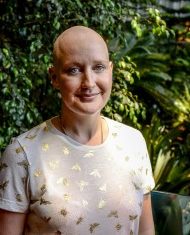A vital head start against cancer
Doctors will be given a valuable head start against cancer with the development of a new test that can identify the 40% of patients with an aggressive form of lymphoma who are not likely to respond to standard treatment.
Professor Maher Gandhi explains the laboratory test and how early access to an alternative and more suitable treatment could improve outcomes for patients with diffuse large B-cell lymphoma (DLBCL).
Giving certainty to patients
Until now lymphoma doctors have lacked a reliable tool that accurately predicts whether a patient will be cured with conventional chemotherapy.
Professor Gandhi and his team of researchers have developed such a tool that will help clinicians decide at the outset the most appropriate therapy for each patient that will give them the best chance of survival.
This is particularly important for the patients who don’t respond to chemotherapy but are currently being treated this way, suffering unnecessary side effects and a poor prognosis.
Early access to alternative treatments
Using this new test clinicians will be able to identify these patients and consider them for alternative targeted therapies that work differently to conventional therapies.
“This type of lymphoma can be fast growing and aggressive, so early diagnosis is vital, as is swift treatment,” Professor Gandhi said.

A patient’s perspective
Lindsey Harrington was diagnosed with non-Hodgkin lymphoma in June this year and said the test developed by Professor Gandhi’s team could give patients like her clarity right from the start about which treatment offered the best chance of survival.
“Immediate treatment is vital for many blood cancers, so anything that helps speed up access to the most appropriate treatment would be a potential lifesaver.”
Last updated on July 1st, 2020
Developed by the Leukaemia Foundation in consultation with people living with a blood cancer, Leukaemia Foundation support staff, haematology nursing staff and/or Australian clinical haematologists. This content is provided for information purposes only and we urge you to always seek advice from a registered health care professional for diagnosis, treatment and answers to your medical questions, including the suitability of a particular therapy, service, product or treatment in your circumstances. The Leukaemia Foundation shall not bear any liability for any person relying on the materials contained on this website.